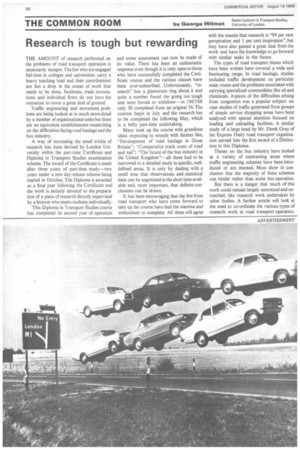Research is tough but rewarding
Page 58

If you've noticed an error in this article please click here to report it so we can fix it.
THE AMOUNT of research performed on the problems of road transport operation is necessarily meagre. The few who are engaged full-time in colleges and universities carry a heavy teaching load and their contributions are but a drop in the ocean of work that needs to be done. Institutes, trade associations and individual .firms do not have the resources to cover a great deal of ground.
Traffic engineering and movement problems are being looked at in much more detail by a number of organizational units but there are no equivalent establishments researching on the difficulties facing road haulage and the bus industry.
A way of increasing the small trickle of research has been devised by London University within the part-time Certificate and Diploma in Transport Studies examination scheme. The award of the Certificate is made after three years of part-time study—two years under a new day-release scheme being started in October. The Diploma is awarded as a final year following the Certificate and the work is entirely devoted to the preparation of a piece of research directly supervised by a lecturer who meets students individually.
This Diploma in Transport Studies course has completed its second year of operation and some assessment can now be made of its value. There has been an enthusiastic response even though it is only open to those who have successfully completed the Certificate course and the various classes have been over-subscribed. Unfortunately, "research" has a glamorous ring about it and quite a number found the going too tough and were forced to withdraw—in 1967/68 only 30 completed from an original 56. The courses begin in July and the research has to be completed the following May, which is a hefty part-time undertaking.
Many took up the course with grandiose ideas expecting to wrestle with themes like, "Development of road haulage in Great Britain"; "Comparative track costs of road and rail"; "The future of the bus industry in the United Kingdom"—all these had to be narrowed to a detailed study in specific, welldefined areas. It is only by dealing with a small area that observations and statistical data can be negotiated in the short time available and, more important, that definite conclusions can be drawn.
It has been encouraging that the few from road transport who have come forward to take up the course have had the stamina and enthusiasm to complete. All these will agree with the maxim that research is "99 per cent perspiration and 1 per cent inspiration", but they have also gained a great deal from the work and have the knowledge to go forward with similar tasks in the future.
The types of road transport theses which have been written have covered a wide and fascinating range. In road haulage, studies included traffic development on particular main routes and the problems associated with carrying specialized commodities like oil and chemicals. Aspects of the difficulties arising from congestion was a popular subject: six case studies of traffic generated from groups of simple service shopping areas have been analysed with special attention focused on loading and unloading facilities. A similar study of a large hotel by Mr. Derek Gray of the Express Dairy road transport organization earned him the first award of a Distinction in this Diploma.
Theses on the bus industry have looked at a variety of contrasting areas where traffic engineering schemes have been introduced or are mooted. Most show in conclusion that the majority of these schemes can hinder rather than assist bus operation.
But there is a danger that much of this work could remain largely unnoticed and untouched, like research work undertaken by other bodies. A further article will look at the need to co-ordinate the various types of research work in road transport operation.




































































































